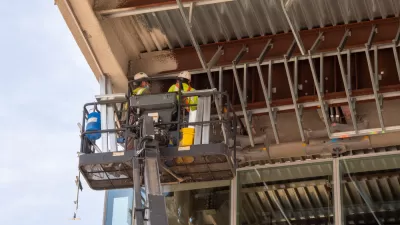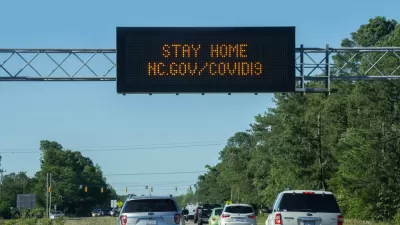The changes coming to the construction industry to protect the safety and health of workers during the pandemic could stay in place for the foreseeable future.

When the pandemic first hit, two approaches to construction work emerged. In one kind of place, most notably Boston, construction work was suspended indefinitely. Other places, like California, included construction work in the category of essential, and even accelerated project timelines with fewer cars on the road. For the first two months of the public health crisis, the construction industry lacked clear direction on the requirements of a safe and healthy construction site. Now, however, more companies are moving forward construction with strict regulations enforced by state and local authorities, and the requirements of safe construction in the time of COVID-19 are beginning to emerge. These new regulatory standards could end up sticking around as the new normal for the industry for the foreseeable future, or they could end up requiring a complete overhaul in the near term if workers begin to encounter the kind of outcomes currently ravaging workers in other sectors of the economy.
Jenn Goodman writes to provide some details on what the future of the construction industry will look like during and after the public health crisis, as the industry plans for long-term changes. "This emphasis on cleaner, less crowded work areas is one that won’t recede after the virus does," writes Goodman.
"The new normal will be reinforced by state, local and federal regulations, such as the ones recently proposed in Washington and Pennsylvania, and in the near future, OSHA could require employers to develop written infectious disease preparedness and response plans, said attorney Michael Rubin, chair of Goldberg Segalla’s national OSHA and Worksite Safety practice group," adds Goodman.
Other predictions included in the article about the new normal in the construction industry: remote work and teleworking will be much more common, and many projects are likely to take longer.
For additional reporting on the public health concerns that linger as construction sites begin to reopen, see also articles by Jonathan Hilburg and Mathew Haag that focus especially on the resumption of construction work in New York City.
FULL STORY: The new normal: 8 ways the coronavirus crisis is changing construction

Maui's Vacation Rental Debate Turns Ugly
Verbal attacks, misinformation campaigns and fistfights plague a high-stakes debate to convert thousands of vacation rentals into long-term housing.

Planetizen Federal Action Tracker
A weekly monitor of how Trump’s orders and actions are impacting planners and planning in America.

In Urban Planning, AI Prompting Could be the New Design Thinking
Creativity has long been key to great urban design. What if we see AI as our new creative partner?

King County Supportive Housing Program Offers Hope for Unhoused Residents
The county is taking a ‘Housing First’ approach that prioritizes getting people into housing, then offering wraparound supportive services.

Researchers Use AI to Get Clearer Picture of US Housing
Analysts are using artificial intelligence to supercharge their research by allowing them to comb through data faster. Though these AI tools can be error prone, they save time and housing researchers are optimistic about the future.

Making Shared Micromobility More Inclusive
Cities and shared mobility system operators can do more to include people with disabilities in planning and operations, per a new report.
Urban Design for Planners 1: Software Tools
This six-course series explores essential urban design concepts using open source software and equips planners with the tools they need to participate fully in the urban design process.
Planning for Universal Design
Learn the tools for implementing Universal Design in planning regulations.
planning NEXT
Appalachian Highlands Housing Partners
Mpact (founded as Rail~Volution)
City of Camden Redevelopment Agency
City of Astoria
City of Portland
City of Laramie





























